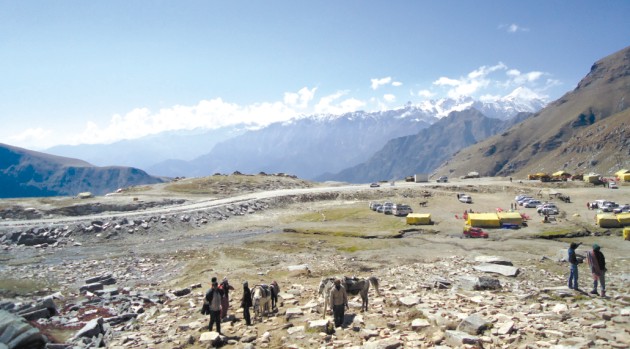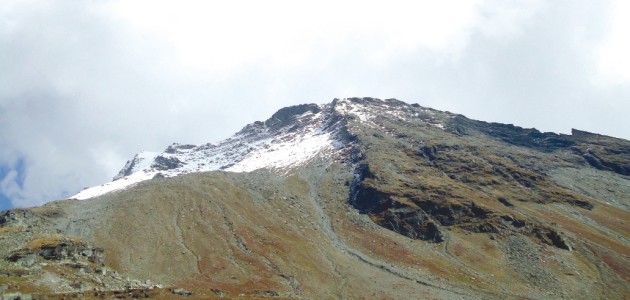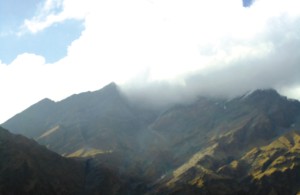|
Travel
EXPLORING CHILLING ROHTANG LA
Mahbub Morshed

The long bumpy ride and arduous trek were definitely worth it. Photo: Mahbub Morshed
Manali, Himachal Pradesh
The serpentine road went high up to the mountains. The weather was perfect to travel to Rohtang pass, one of the highest in the world, from Manali in Himachal Pradesh. The distance between the two places is nearly 51 kilometres. Even in the summer it takes about three hours to reach there because of the endless turns and bumps on the narrow path. The pass, also called, Rohtang La in Tibetan language remains snowbound for about six months from November.
It was half past nine in the morning. The sun shone bright. Not even a patch of cloud could be seen on the horizon. It was the first week of October and winter had not arrived yet in this part of the globe. Usually, it starts to snow there from November making the road to Rohtang inaccessible.
I along with five new friends rode a Chevrolet jeep locally known as Tavera. I happened to meet them on the bus from Shimla to Manali. They were in Shimla to relax after completing their internship at the Manipal University. Felix Meier and Sebastian Bergt were from Germany, Nevena Dutina and Marija Tomic from Serbia and Nastya Lysa from Ukraine. It's really amazing how strangers become friends so quickly. All you have to do is strike up a conversation.
I had a great view as I sat in the front. The middle-aged driver, Kishore Thakur, was composed and calm. From the way he controlled the vehicle, one could easily guess that he knew the rough terrain like the palm of his hand.
"I'm from Manali. I know all these places very well," said Kishore in Hindi.
He was tall, fair, strong and smart too.
"Do you know what does Rohtang La means?" he asked me.
When I shook my head, he said, "A pile of corpses."
The place earned the name in Tibetan language as many died trying to cross the pass on foot in the brutal winter. The Rohtang pass had been an ancient trade route that connected Kullu valley in the south with high-altitude Lahaul and Spiti valleys in the north. It has also been of great strategic importance to India for being a vital gateway to Ladakh. Hundreds of Indian troops have been posted in the region along the disputed border with China.
India has now embarked on a $320 million project to set up a tunnel to bypass Rohtang La, mainly because of its importance as a military route. Once completed, it would take a little more than a half an hour to travel to Manali from Rohtang, even in the harshest winter. A journey to the pass would not be all that adventurous, I thought to myself.
I peered out of the window to see the beautiful snow-capped mountains. They seemed very close but actually were far away! A branch of the Beas River flowed through the mountains. The narrow stream ran down with extreme velocity as if it was trying to sweep away everything in its path. But something held its position against the strong tide: stones of all shapes, abundant on the riverbed.

A small waterfall at Rohtang La. Photo: Mahbub Morshed
As the vehicle took a turn, an army camp came in sight. Structures there looked like playthings from the top. We headed one more hour further north. Kishore suddenly became a bit serious and cautious.
"Get ready for a bumpy ride. About sixteen and a half kilometres of the narrow road are in bad shape."
The road at several points got blocked by huge chunks of earth after a rain-induced mudslide a few days back. Thankfully the road had been cleared. "Otherwise, it would not be possible to go there," explained the local driver.
The road was in a mess. We had to roll up the windows of the jeep to save ourselves from dust. Chunks of earth that came crushing down during downpour spilled onto the narrow road. They made it more difficult to pass through the narrow path. A bumpy ride, really. I held onto my seat for balance. At times the jerk was so bad that it made me jump off the seat a few inches. But the comfort was that Kishore never lost his calm.
The relief came shortly after an hour. The rest of the ride was better.
"Rohtang is not far away," said the driver much to our comfort.
"It will be cold there. Have you brought warm clothes and gloves with you?"
I told him that I had a jacket, no gloves.
"Oh! You can hire a jacket and a pair of gloves for 200 rupees. You can also ride a horse right up to a snow-capped mountain," he said.
"I'll decide once I get there," I told him.
We reached a place that looked like a base camp of sorts. It was half past noon. Dozens of vehicles were parked on one side of the road while the other side was occupied with tents. Plastic chairs and tables were in front of the tents that served as makeshift restaurants for tourists. You can sit there and have food at ridiculously high prices.
It was much colder there than I had expected. But the weather was quite 'comfy' for my European friends. A small group of enthusiastic brokers and guides flanked us. They were offering almost everything a tourist might need there -- from gloves to horses. We ignored them. Felix sensed that I was getting stiff with cold.
"Do you need another jacket man? I have a spare one in my backpack."
I was not in a position to say no. I thanked him for a couple of times for being so generous.

Snowy mountains of Rohtang La. Photo: Mahbub Morshed
The snowy mountains shone in the distance. Instead of riding horses up to the mountains, we decided to trek one without any snow on the peak. What seemed to be an easy climb turned out to be an arduous task. Predictably, I fell far behind my skilled hiker friends. Felix and Sebastian were ahead followed by Marija and Nastya Lysa. Nevena slowed down, perhaps, out of sympathy for me. I halted to catch my breath. Nevena and I sat on an uneven rock. The rest continued ahead.
Suddenly we faced a big hurdle. Stones started fall to from the top making it risky to hike further up. Felix and Sebastian were only several metres from the peak. We decided to climb down to a safer spot.
It took us nearly an hour to reach the base camp. We chose a tiny makeshift restaurant for lunch. An elderly Tibetan woman with her young son was cooking and serving food to tourists. Items on the menu were not plenty; we didn't expect it to be in a place like that. I ordered two slices of bread with an omelet. We had tea and left for the Solang Valley, a favourite destination for skiing and cable-car ride.
We reached the valley at around 4:30pm. Patches of cloud were hovering in the sky. It was cold. Kishore insisted that we shouldn't waste time and get back to the car within an hour.
It would be very risky to ply the treacherous mountain roads at night. We promised him to get back within an hour. The valley is a favourite tourist spot for skiing. But there wasn't even a single flake of snow anywhere. We decided to take a cable-car ride. It took about 15 minutes to get to the top of the valley. It had started drizzling by the time we reached there.
 |
Photo: Mahbub Morshed |
We found a small restaurant there and sat on chairs under a big umbrella right in front of it. The view from the top of the green valley mesmerised us.
Time was running out. We hurriedly had coffee and rode the cable car down the valley. Kishore was happy to see us.
"It would take a bit more than half an hour," said the local driver.
It was getting dark but we didn't worry that much. We knew that Kishore could drive us safely back to our hotels.
I was very exhausted. All I could think of is a hot meal and a warm bed. I knew that I would get them soon -- in thirty minutes' time.
Kishore dropped my friends at their hotel in Old Manali and then took me to the bus stand, just a few yards from my hotel. I walked back to my hotel. I was almost falling from fatigue but every second of that trip was worth it.
Copyright
(R) thedailystar.net 2010 |
